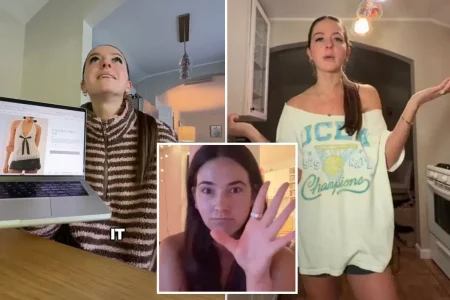Leila Layzell, a British tourist visiting Bondi Beach in Australia, has ingeniously turned the tables on unwanted male attention, devising a clever strategy that has resonated with women worldwide and sparked widespread discussion online. In a viral video, Layzell deftly deflects a man’s request for her phone number by proposing a seemingly innocent question: “Can I show my mom my husband?” The man’s immediate reaction, a swift retreat and an attempt to hide his face from the camera, speaks volumes about the underlying dynamics of the encounter. Layzell’s tactic, invoking the presence of a hypothetical husband and the potential scrutiny of a maternal figure, effectively exposes the man’s likely disingenuous intentions and highlights the uncomfortable reality many women face when navigating unwanted advances in public spaces.
The video, which quickly gained traction online, has become a catalyst for a broader conversation about the pervasive nature of unwanted male attention and the strategies women employ to navigate these situations. Commenters flooded the post, speculating about the man’s motives for his sudden disinterest. Many surmised that his hasty retreat and desire to avoid being filmed suggested a hidden relationship or ulterior motives. Theories ranged from infidelity to potentially harmful intentions, reflecting a collective understanding of the underlying power dynamics and the potential risks associated with such encounters. Comments like “If man is scared to show his face like that after asking for a number, he has wife or has criminal thoughts” and “He’s most likely married, welcome to Sydney. This is a common recurrence” exemplify the prevalent suspicion surrounding the man’s behavior and underscore the shared experiences of women who have faced similar situations.
Layzell’s approach, while appearing lighthearted, strategically introduces a layer of accountability and potential consequences that effectively filters out insincere or potentially harmful interactions. By suggesting a virtual introduction to her “mother” and “husband” via FaceTime, she cleverly shifts the dynamic, placing the onus on the man to consider the implications of his actions. This subtle yet powerful move transforms a potentially uncomfortable situation into an opportunity to expose the man’s true intentions. The man’s immediate withdrawal suggests a lack of genuine interest and a desire to avoid any form of scrutiny, indicating that his initial approach was likely superficial or even deceptive.
The widespread positive response to Layzell’s video underscores the effectiveness of her tactic and its resonance with women who have experienced similar situations. Numerous comments praised her ingenuity and labeled her actions as “doing god’s work,” recognizing the strategic brilliance of her approach. The video’s popularity highlights a collective frustration with the prevalence of unwanted male attention and the need for effective strategies to manage these encounters. Layzell’s method provides a practical and empowering tool for women to assert their boundaries and filter out unwanted advances, offering a sense of agency in situations that can often feel disempowering.
The incident on Bondi Beach and the subsequent viral video have sparked a much-needed dialogue about the dynamics of unwanted male attention and the challenges women face in navigating these interactions. Layzell’s clever tactic has not only provided a practical solution for deflecting unwanted advances but also served as a catalyst for a broader discussion about consent, respect, and the importance of challenging inappropriate behavior. The overwhelming support for her approach demonstrates a growing awareness and intolerance for unwanted male attention, signaling a shift towards greater accountability and a demand for safer and more respectful interactions in public spaces.
The “meet my mom and husband” strategy, though simple in its execution, is profound in its implications. It empowers women to take control of uncomfortable situations, subtly exposing the intentions of those who offer unwanted attention. This approach allows women to maintain a lighthearted demeanor while simultaneously establishing clear boundaries and filtering out insincere or potentially harmful interactions. The widespread acclaim for Layzell’s tactic underscores the need for continued dialogue and action to address the persistent issue of unwanted male attention and to foster a culture of greater respect and understanding in all social interactions.















